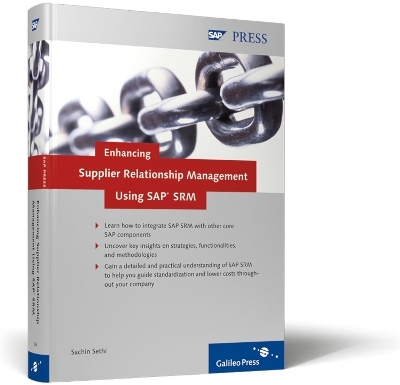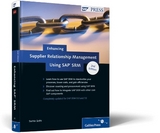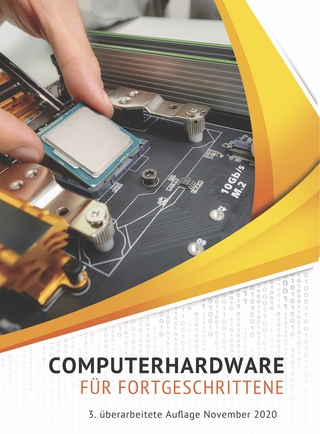
Enhancing Supplier Relationship Management Using SAP SRM
SAP Press (Verlag)
9781592290680 (ISBN)
- Titel erscheint in neuer Auflage
- Artikel merken
This book gives you a detailed and practical understanding of the essentials of SAP SRM, including its functionality, new product enhancements, and best practices for optimizing this key solution. The author examines how SAP SRM automates processes between sourcing and procurement within the enterprise and across the supply base, thus increasing supply chain visibility, while yielding close-loop insight into global spending. By reading this book, packed with valuable implementation strategies and methodologies, you can drastically enhance your existing procurement and supply chain efficiency. In addition, you'll quickly develop a much deeper understanding of the most critical issues related to SAP SRM upgrades. Packed with exclusive tips and tricks, practical examples, and expert analysis on the changes in SAP SRM 5.0 and 6.0, this book also helps you better understand integration issues and SAP SRM interactions with core SAP R/3 components such as MM, FI and HR.
You'll also get clarification on where and how SAP SRM fits into a corporate landscape and you'll learn the ins and outs of strategic purchasing, operational procurement, integration, implementation, and performance reporting with SAP NetWeaver BI, plus much more. This book is your comprehensive guide to understanding how you can use SAP SRM to enhance procurement in your company.
Sachin Sethi, the resident SAP SRM solution expert at searchsap.com, has more than nine years of consulting experience implementing eBusiness solutions and ERP applications. A certified SAP SRM Solutions expert, Sachin has worked with the SAP SRM/EBP product since its initial BBP 1.0 release.
Part I: How SRM Fits within an Organization 1. Introduction to Supplier Relationship Management ... 29 ... 1.1 E-Procurement and SRM ... 30 ... 1.2 The SRM Vendor Landscape ... 34 ... 1.3 Why SAP SRM? ... 35 ... 1.4 Summary ... 37 Part II: What is SAP SRM? 2. SAP SRM - An Introduction ... 41 ... 2.1 Evolution of SAP SRM ... 41 ... 2.2 SRM and SAP Enterprise Applications ... 42 ... 2.3 Benefits of SAP SRM ... 43 ... 2.4 Dissecting my SAP SRM ... 48 ... 2.5 SAP Components ... 51 ... 2.6 Summary ... 55 3. Operational Procurement ... 57 ... 3.1 Self-Service Procurement ... 61 ... 3.2 Services Procurement ... 129 ... 3.3 Plan-Driven Procurement ... 136 ... 3.4 What's New in Operational Procurement? ... 140 ... 3.5 Summary ... 143 4. Strategic Sourcing and Contract Management ... 145 ... 4.1 Strategic Sourcing ... 146 ... 4.2 Contract Management ... 177 ... 4.3 What's New in Sourcing and Contract Management? ... 196 ... 4.4 Summary ... 198 5. Supplier Enablement ... 199 ... 5.1 Supplier Enablement Using SAP SRM ... 201 ... 5.2 Supplier Registration ... 205 ... 5.3 Supplier Collaboration: Order Collaboration ... 210 ... 5.4 Supplier Collaboration: Inventory and Replenishment ... 230 ... 5.5 Design Collaboration Using SAP PLM ... 232 ... 5.6 Design Collaboration Using SAP SRM ... 233 ... 5.7 Summary ... 236 Part III: SAP SRM Implementation, Integration, and Upgrades 6. Catalog and Content Management - Crafting Your Catalog Strategy ... 241 ... 6.1 Building a Robust Catalog Strategy ... 243 ... 6.2 Catalog and Content Management Using SAP SRM ... 254 ... 6.3 Summary ... 278 7. Choosing Implementation Scenarios ... 281 ... 7.1 Overview - SAP SRM Implementation Scenarios ... 281 ... 7.2 The Classic Scenario ... 283 ... 7.3 The Extended Classic Scenario ... 289 ... 7.4 The Standalone Scenario ... 295 ... 7.5 Other Scenarios ... 299 ... 7.6 Things to Remember and to Watch Out For ... 301 ... 7.7 Relevant OSS Notes ... 302 ... 7.8 Summary ... 303 8. Organizational Structure ... 305 ... 8.1 Overview of the Organizational Structure in SAP SRM ... 307 ... 8.2 The Details Area of the Organizational Structure ... 313 ... 8.3 Uploading Attributes via a Function Module ... 327 ... 8.4 Customizing Attribute Maintenance ... 329 ... 8.5 Deleting Organizational Objects in SRM ... 332 ... 8.6 Best Practices for Creating and Managing the Organizational Structure ... 333 ... 8.7 Integration with SAP HR - A Key Decision ... 335 ... 8.8 Pros and Cons of Creating an Organizational Structure in EBP or Distributing from HR ... 341 ... 8.9 Impact of the Extended Classic Scenario on SRM Organizational Structure ... 343 ... 8.10 System Refresh Procedure Steps ... 344 ... 8.11 Things to Remember ... 346 ... 8.12 What's New in the Organizational Structure? ... 346 ... 8.13 Summary ... 347 9. Integration with Financials and Project Systems ... 349 ... 9.1 Financial Accounting in SAP ... 350 ... 9.2 Integration of SAP Financials with SAP SRM ... 352 ... 9.3 Overview of the Purchase-to-Pay Cycle ... 362 ... 9.4 Budget Check in SAP SRM ... 367 ... 9.5 Integration with Project Systems ... 370 ... 9.6 Limitation of Extended Classic Scenario for SAP Public Sector Solution ... 374 ... 9.7 Relevant OSS Notes ... 377 ... 9.8 Summary ... 377 10. The Role of Workflow in SAP SRM ... 379 ... 10.1 Workflow in SAP SRM ... 382 ... 10.2 Standard Delivered workflows in SRM ... 387 ... 10.3 Online and Offline Approvals ... 406 ... 10.4 Implementation Best Practices ... 414 ... 10.5 Security and Authorizations in Workflow ... 417 ... 10.6 Responsibility Rules vs. Custom Z tables ... 422 ... 10.7 Extras ... 423 ... 10.8 Relevant OSS Notes ... 424 ... 10.9 Summary ... 425 11. Managing Security in SAP SRM ... 427 ... 11.1 Overview of Security in SAP ... 428 ... 11.2 Security in SAP SRM ... 430 ... 11.3 User Creation in SRM for Enterprise Buyer (Internal) ... 437 ... 11.4 User Creation in SRM for Enterprise Buyer (External) ... 450 ... 11.5 Deleting Users in SRM ... 452 ... 11.6 Checking Users in SRM ... 453 ... 11.7 Roles and Authorizations in SRM ... 455 ... 11.8 Impact of Organizational Structure in SRM on Security ... 463 ... 11.9 Position-Based Security in SRM ... 469 ... 11.10 Relevant OSS Notes ... 472 ... 11.11 Summary ... 472 12. Dependency of Master Data in SAP SRM and SAP R/3 ... 473 ... 12.1 Middleware ... 475 ... 12.2 Locations, Payment Terms, and Pricing Conditions ... 478 ... 12.3 Interlinkages ... 481 ... 12.4 Vendor Lists, Contracts, and Catalogs ... 481 ... 12.5 Delivery Addresses ... 486 ... 12.6 External Business Partners in SRM ... 488 ... 12.7 Relevant OSS Notes ... 498 ... 12.8 Summary ... 498 13. Architecture and Technology of SAP SRM ... 499 ... 13.1 SAP SRM Components and Matrix ... 501 ... 13.2 SAP SRM Architecture Based on Business Scenario ... 506 ... 13.3 SAP SRM Business Scenarios Using SAP NetWeaver XI ... 513 ... 13.4 ITS as Part of Web AS ... 514 ... 13.5 SRM Sizing ... 515 ... 13.6 Summary ... 516 14. Upgrade - A How-To Approach ... 519 ... 14.1 Why Upgrade? ... 520 ... 14.2 Answer the Question: Technical or Functional? ... 524 ... 14.3 Understand Your Current Environment ... 525 ... 14.4 Expected Changes in New SRM Release ... 529 ... 14.5 Upgrade - Tools and Resources ... 531 ... 14.6 Best Practices - Upgrade Impact ... 535 ... 14.7 SAP SRM Upgrade - Lessons Learned ... 542 ... 14.8 Upgrade Assessment - via a Questionnaire ... 543 ... 14.9 Summary ... 546 15. Performance Reporting via SAP NetWeaver Business Intelligence ... 547 ... 15.1 SAP NetWeaver BI with SAP SRM ... 548 ... 15.2 Standard SAP BI Business Content for SAP SRM ... 558 ... 15.3 SAP SRM Implementation Scenario Impact on BI Reporting ... 568 ... 15.4 What's New in SAP SRM 5.0 Analytics? ... 576 ... 15.5 Things to Remember ... 580 ... 15.6 Relevant OSS Notes ... 580 ... 15.7 Summary ... 581 16. Enterprise Portals and SAP SRM ... 583 ... 16.1 SRM Business Packages for Enterprise Portal ... 586 ... 16.2 Portal Security ... 587 ... 16.3 Considerations for Portal Strategy ... 590 ... 16.4 Summary ... 591 ... 17.1 SAP SRM and SAP Government Procurement ... 595 ... 17.2 What is Different in Government Procurement? ... 598 ... 17.3 Summary ... 601 ... 18.1 Integrate Organizational Structure with SAP HR ... 605 ... 18.2 Workflow: Restriction for Changing and Adding Approvers in the Shopping Cart ... 613 ... 18.3 MRP Integration with SAP SRM ... 616 ... 18.4 Summary ... 620 ... 18.5 Book Conclusion ... 621 A. SRM Functionality Matrix ... 625 B. Jobs that Require Scheduling ... 627 ... B.1 Jobs Required in SAP SRM ... 627 ... B.2 Jobs Required in SAP R/3 or ERP ... 631 C. Using Different Browsers with SAP SRM ... 633 D. Using Business Add-Ins (BAdIs) with SAP SRM ... 635 ... D.1 Implementing a BAdI ... 636 ... D.1.1 Multiple Use ... 636 ... D.1.2 Filter Dependent ... 636 ... D.2 Examples of BAdIs in SAP SRM ... 637 ... D.2.1 BAdI: Change Display in Shopping Cart (BBP_SC_MODIFY_UI) ... 637 ... D.2.2 BAdI: Define Target Objects (BBP_TARGET_OBJECTS) ... 638 ... D.2.3 BAdI: Change Purchasing Document data (BBP_DOC_CHANGE_BAdI) ... 639 ... D.2.4 BAdI: Check Purchasing Document (BBP_DOC_CHECK_BAdI) ... 640 ... D.3 List of BAdIs in SAP SRM ... 641 E. Customer Fields in SAP SRM ... 649 ... E.1 Customer-Specific fields in SRM document types ... 649 ... E.1.1 Procedure for Creating a User-Defined Field ... 650 ... E.2 Related OSS NOTES ... 652 F. Business Objects in SAP SRM ... 655 G. Authorization Objects ... 657 H. Quiz for Testing your SAP SRM Knowledge ... 659 ... H.1 Questions ... 659 ... H.2 Answers ... 663 ... H.3 Explanations for the Answers ... 663 I. System Refresh Procedures ... 671 J. Organization Structure Attributes ... 673 K. Useful Transactions and Function Modules ... 681 L. About the Author ... 686
| Erscheint lt. Verlag | 28.6.2007 |
|---|---|
| Verlagsort | Maryland |
| Sprache | englisch |
| Maße | 180 x 230 mm |
| Einbandart | gebunden |
| Themenwelt | Informatik ► Weitere Themen ► Hardware |
| Wirtschaft ► Betriebswirtschaft / Management ► Logistik / Produktion | |
| Schlagworte | Beschaffung • Lieferant • Materialwirtschaft • SAP SRM |
| ISBN-13 | 9781592290680 / 9781592290680 |
| Zustand | Neuware |
| Informationen gemäß Produktsicherheitsverordnung (GPSR) | |
| Haben Sie eine Frage zum Produkt? |
aus dem Bereich



